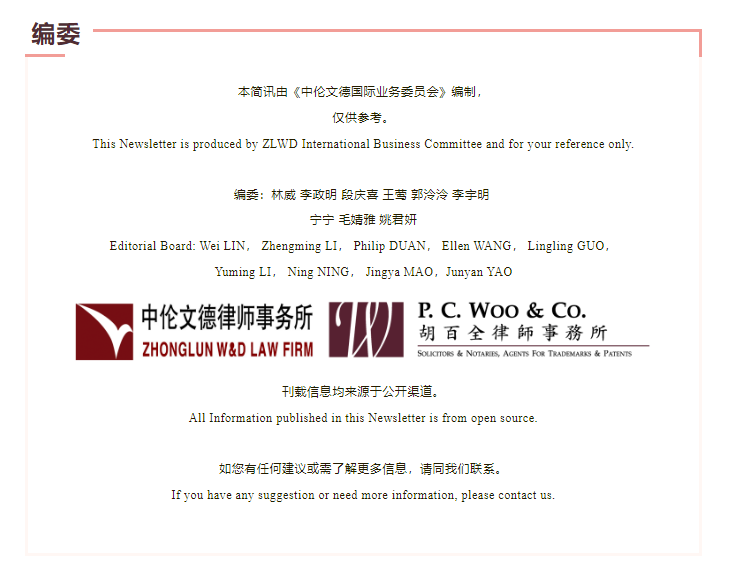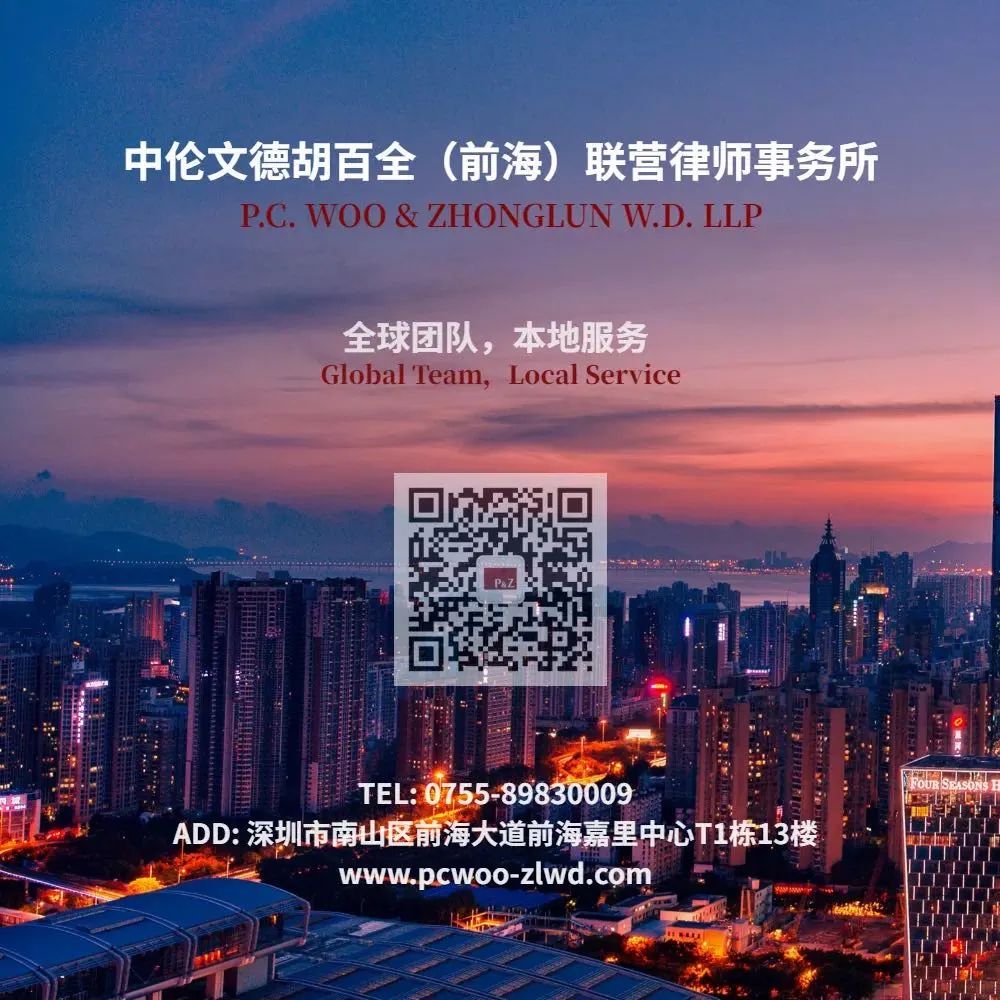
NEWS

NEWS

United Nations Commission on International Trade Law Issued Code of Conduct for Arbitrators in International Investment Dispute Resolution and Commentary
On 15 September 2023, the United Nations Commission on International Trade Law ("UNCITRAL") issued Code of Conduct for Arbitrators in International Investment Dispute Resolution and Commentary (hereinafter referred to as the "Code of Conduct for Arbitrators"). The main elements are set out below:
The Code of Conduct for Arbitrators clarifies the scope of its application and ensures its binding nature by providing a template for annexed statements to be signed by arbitrators and their co-Arbitrators.
The Code of Conduct for Arbitrators clarifies the specific obligations of confidentiality, diligence and disclosure that arbitrators shall undertake in international investment dispute cases, so that the standard of professional ethical obligations for arbitrators is no longer in a grey area.
The Code of Conduct for Arbitrators contains a number of well reasoned and balanced provisions that not only incorporate existing practice but also respond to calls for reform. The most notable of these is the compromise found in the Code of Conduct for Arbitrators on the important issue of multiple roles, which provides that, for a period of three years from the date on which the role as an arbitrator ceases, a retired arbitrator shall not act as a legal representative or an expert witness in any international investment dispute or other proceeding involving the same measures, the same or related parties, unless the parties have agreed otherwise.
Foreign State Commercial Arbitration and Investment Arbitration Shall not Enjoy Immunity from Jurisdiction
On 1 September 2023, the 5th Session of the Standing Committee of the 14th National People's Congress of the People's Republic of China adopted the Foreign State Immunity Law of the People's Republic of China, which is effective on January 1, 2024. Among other things, Article 12 provides for matters relating to immunity from jurisdiction in commercial and investment arbitration involving foreign states.
Article 12 With respect to any dispute arising out of commercial activities between a foreign state and an organization or individual of any other country including the People's Republic of China that is referred to arbitration under a written agreement or any dispute between a foreign state and an organization or individual of any other country including the People's Republic of China for which both parties agree in written in an international investment treaty etc. to refer such dispute to arbitration, in respect of the following matters requiring judicial review, the foreign state shall not enjoy immunity from jurisdiction of a court of the People's Republic of China over the following matters to be reviewed by the court:
1. the validity of an arbitration agreement;
2. recognition and enforcement of an arbitration award;
3. setting aside of an arbitration award; and
4. other matters prescribed by law to be reviewed by the court of the People's Republic of China.
The Law Commission Publishes the Review of the Arbitration Act 1996: Final Report and Bill and Draft Law Revision
On 6 September 2023, the Law Commission completed its review of the Arbitration Act 1996 and published the Final Report and Bill and draft amendments (hereinafter referred to as the "Final Report"). The Final Report includes draft law revision. The Final Report discusses and proposes changes to ten major issues: confidentiality of arbitration, independence of arbitrators and the disclosure regime, discriminatory issues in arbitration, immunity of arbitrators, summary judgment in a manifestly unmeritorious case, powers of the courts in support of the arbitral process, emergency arbitrators, challenges to awards on the ground that the arbitral tribunal lacks substantive jurisdiction, appeals on points of law, and the law applicable to the arbitration agreement.
The draft revision do not make any significant changes to the original law. The English Law Commission reported that interviewees were generally of the view that the Arbitration Act 1996 was relatively sound and did not need to be fundamentally amended, and that amendments to Arbitration Acts should be made in a gradual manner in order to keep pace with the development of the times.
Intermediate People's Court of Ningbo, Zhejiang Province:
If the Agreed Arbitration Institution Does not Exist, the Arbitration Clause can Determine the Validity Through the Consent Between the Parties
Legal Basis:
Interpretation of the Supreme People's Court on Certain Issues relating to Application of the Arbitration Law of the People's Republic of China
Article 6
Where an arbitration is agreed to be conducted by an arbitration agency at a fixed locality and only one arbitration agency exists at that locality, that arbitration agency shall be deemed as the arbitration agency stipulated under the arbitration agreement.
Case Description:
On 18 January 2019, Jiangxi Deyou Technology Co., Ltd. (hereinafter referred to as "Deyou Company") and Ningbo Doush HYDRAULIC Co., Ltd. (hereinafter referred to as the "Doush Company") entered into a contract, of which Article 14 states: "All disputes between the two parties arising out of or in connection with this contract shall be submitted to the Ningbo Sub-commission of the China International Economic and Trade Arbitration Commission ("CIETAC") for arbitration and settlement in accordance with the arbitration rules of the Commission". 15 November 2022, due to the disputes between the two parties, Doush Company filed an application for arbitration with the Zhejiang Sub-commission of CIETAC. Deyou Company claimed that after its enquiry on the official website of CIETAC and the reply from Zhejiang Sub-commission of CIETAC, the Ningbo Sub-commission of CIETAC as agreed in the contract between the two parties did not exist. Moreover, the application for arbitration submitted by Doush Company was not made to the Ningbo Sub-Commission of CIETAC as agreed in the contract between the two parties. Therefore, Deyou Company filed a lawsuit with the Intermediate People's Court of Ningbo, Zhejiang Province (hereinafter referred to as the "Court"), requesting the Court to: 1) confirm that the arbitration clause in the contract signed between Deyou Comapny and Doush Comapny was invalid; and 2) confirm that the Ningbo Sub-commission of the CIETAC did not have any jurisdiction over the disputes in this case.
Court’s View:
Although the arbitration institution agreed by both parties, Ningbo Sub-Commission of CIETAC, did not exist, CIETAC has only one arbitration institution in Zhejiang Province, namely, Zhejiang Sub-Commission of CIETAC, and there was a clear agreement between both parties to submit the dispute to arbitration and to settle it in Ningbo, according to Article 6 of Interpretation of the Supreme People's Court on Certain Issues relating to Application of the Arbitration Law of the People's Republic of China, it can be understood that the agreement of the parties was actually to be arbitrated by the Zhejiang Sub-Commission of the CIETAC, and the arbitration clause in question shall be deemed to be valid. The dispute shall be continued to be heard by the Zhejiang Sub-Commission of CIETAC.
In conclusion, in accordance with Article 6 of Interpretation of the Supreme People's Court on Certain Issues relating to Application of the Arbitration Law of the People's Republic of China, the Court ruled to reject the application of Jiangxi Deyou Technology Co., Ltd. to confirm that the arbitration clause was invalid and that the Zhejiang Sub-Commission of the CIETAC did not have any jurisdiction over the disputes in the case.
Hong Kong Court of Final Appeal:
Whether Preconditions to Arbitration Clauses Are Satisfied Generally Does Not Concern the Jurisdiction of the Arbitral Tribunal
Case Description:
A company C established in Hong Kong and a company D established in Thailand entered into an agreement regarding the operation of a jointly-owned broadcasting satellite. The contract, which was made subject to Hong Kong law, stipulated certain pre-arbitration procedures: "if any controversy, dispute or claim arises between the Parties..., the Parties shall attempt in good faith promptly to resolve such dispute by negotiation. The agreement further provided that "Either Party may, by written notice to the other, have such dispute referred to the Chief Executive Officers of the Parties for resolution" and that "If any dispute cannot be resolved amicably within sixty (60) Business days of the date of a Party’s request in writing for such negotiation, or such other time period as may be agreed, then such dispute shall be referred by either Party for settlement exclusively and finally by arbitration. As a result of Company C's breach of the agreement, Company D initiated arbitration at the Hong Kong International Arbitration Centre (HKIAC).
Company C objected to the arbitration going ahead on the ground that the dispute had not been referred to the Chief Executive Officers of the Parties and that the pre-arbitration procedures had not been complied with. the Tribunal held that the first sentence in Clause 14.2 mandatorily required the parties to attempt in good faith to resolve any dispute by negotiation, but the reference of dispute to the respective Chief Executive Officers mentioned in the second sentence of Clause 14.2 was optional. Company C then applied to the High Court of Hong Kong to set aside the arbitral award pursuant to section 81 of the Arbitration Ordinance (Cap. 609) (the "Ordinance"), which corresponds to article 34 of the Model Law. The High Court of Hong Kong ultimately held that "according to the consistent view of international arbitral tribunals and national courts", non-compliance with the conditions precedent for commencement of arbitration proceedings under a contract involves a question of admissibility rather than a question of jurisdiction, and therefore dismissed Company C's application. Company C appealed and the Court of Second Instance of the Court of Appeal of the High Court held that the question as to the existence and scope of the arbitration agreement and its validity was essentially a jurisdictional issue; whereas the specific claims as to whether the preconditions for arbitration had been satisfied were questions of admissibility. Unless the parties have expressly agreed in the contract that failure to follow the relevant preliminaries will have an impact on the jurisdiction of the arbitral tribunal, it is more widely recognised internationally, and in line with the legislative spirit and judicial policy of the relevant Hong Kong law, that this issue does not relate to the jurisdiction of the arbitral tribunal, but is an admissible dispute. In other words, the arbitral tribunal had the power to rule on it and therefore rejected Company C's application.
Company C then appealed to the Hong Kong Court of Final Appeal (hereinafter referred to as the "Court").
Court’s View:
The judges of the Court have ruled in common to dismiss the the claims of company C. However, the majority and minority judges of the Court took different positions on whether the issues of "admissibility" and "jurisdiction" should be distinguished here. The majority considered that the distinction between admissibility and jurisdiction did provide a useful aid to interpretation in deciding whether a particular objection merited judicial intervention, and that the distinction should be drawn. The question as to whether the preconditions for initiating arbitration had been fulfilled generally related only to the admissibility of the request for arbitration and not to whether the arbitral tribunal had jurisdiction. At the same time, it should be made clear that one of the important objectives of the UNCITRAL Model Law on International Commercial Arbitration, as set out in Article 2A of the Model Law (which is also one of the important objectives of the New York Convention on the Enforcement of Arbitral Awards), is to promote and facilitate international arbitration by harmonising the arbitration regimes of different countries, and that it also clarifies the limitations of judicial intervention in arbitration, and that Hong Kong should make it clear that it adopts the following position in support of and to promote international arbitration. The minority view was that the jurisdiction/admissibility distinction was "an unnecessary interference and redundant. This ground relates to referrals to arbitration under section 81(2)(a)(iii) of the Arbitration Ordinance (i.e., the wording of Article 34(2)(a)(iii) of the Model Law, i.e., "the award deals with a dispute which is not a matter which the referral purports to determine or which is outside the scope of the referral, or the award contains a decision on a matter outside the scope of the referral"). "This ground relates to the scope of submission to arbitration and it does not provide any scope for the court to examine the merits of a particular dispute, including disputes relating to compliance with pre-arbitration obligations/conditions.
In summary, the Hong Kong Court of Final Appeal dismissed Company C's claim for setting aside the arbitral award.


